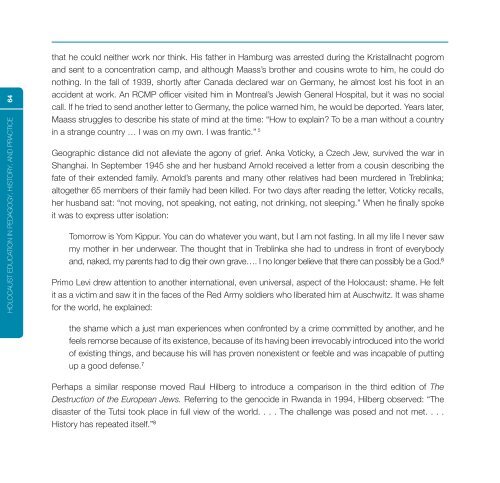2kNreeJ
2kNreeJ
2kNreeJ
Create successful ePaper yourself
Turn your PDF publications into a flip-book with our unique Google optimized e-Paper software.
HOLOCAUST EDUCATION IN PEDAGOGY, HISTORY, AND PRACTICE 64<br />
that he could neither work nor think. His father in Hamburg was arrested during the Kristallnacht pogrom<br />
and sent to a concentration camp, and although Maass’s brother and cousins wrote to him, he could do<br />
nothing. In the fall of 1939, shortly after Canada declared war on Germany, he almost lost his foot in an<br />
accident at work. An RCMP officer visited him in Montreal’s Jewish General Hospital, but it was no social<br />
call. If he tried to send another letter to Germany, the police warned him, he would be deported. Years later,<br />
Maass struggles to describe his state of mind at the time: “How to explain? To be a man without a country<br />
in a strange country … I was on my own. I was frantic.” 5<br />
Geographic distance did not alleviate the agony of grief. Anka Voticky, a Czech Jew, survived the war in<br />
Shanghai. In September 1945 she and her husband Arnold received a letter from a cousin describing the<br />
fate of their extended family. Arnold’s parents and many other relatives had been murdered in Treblinka;<br />
altogether 65 members of their family had been killed. For two days after reading the letter, Voticky recalls,<br />
her husband sat: “not moving, not speaking, not eating, not drinking, not sleeping.” When he finally spoke<br />
it was to express utter isolation:<br />
Tomorrow is Yom Kippur. You can do whatever you want, but I am not fasting. In all my life I never saw<br />
my mother in her underwear. The thought that in Treblinka she had to undress in front of everybody<br />
and, naked, my parents had to dig their own grave…. I no longer believe that there can possibly be a God. 6<br />
Primo Levi drew attention to another international, even universal, aspect of the Holocaust: shame. He felt<br />
it as a victim and saw it in the faces of the Red Army soldiers who liberated him at Auschwitz. It was shame<br />
for the world, he explained:<br />
the shame which a just man experiences when confronted by a crime committed by another, and he<br />
feels remorse because of its existence, because of its having been irrevocably introduced into the world<br />
of existing things, and because his will has proven nonexistent or feeble and was incapable of putting<br />
up a good defense. 7<br />
Perhaps a similar response moved Raul Hilberg to introduce a comparison in the third edition of The<br />
Destruction of the European Jews. Referring to the genocide in Rwanda in 1994, Hilberg observed: “The<br />
disaster of the Tutsi took place in full view of the world. . . . The challenge was posed and not met. . . .<br />
History has repeated itself.” 8


